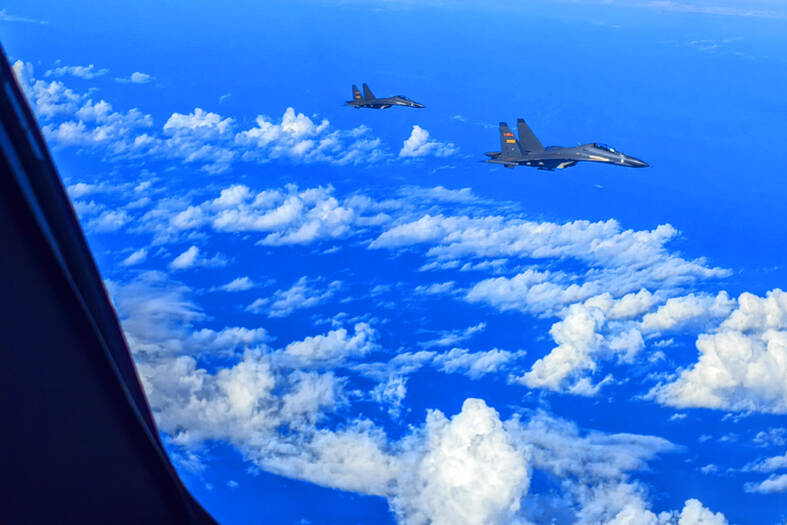China’s military said it staged “strike drills” in the sea and airspace around Taiwan yesterday in response to an unspecified “provocation” by Taipei and Washington.
China staged war games around Taiwan in August following a visit to Taipei by US House of Representatives Speaker Nancy Pelosi, and on Saturday it condemned the US for a new defense authorization law that boosts military assistance for Taiwan.
In a brief statement, the Eastern Theater Command of China’s People’s Liberation Army said it had carried out “joint combat readiness patrols and joint firepower strike drills” around Taiwan, although it did not specify the exact location.

Photo: AP
“This is a resolute response to the current escalation of collusion and provocation from the United States and Taiwan,” it said, without giving details.
“Theater forces will take all necessary measures to resolutely defend national sovereignty and territorial integrity,” it added.
The Ministry of National Defense reported that eight Chinese military aircraft and three naval ships had been detected near Taiwan between 6am on Saturday and 6am yesterday.
Taiwanese fighter jets were deployed to warn the Chinese aircraft, and air defense missile systems were deployed to monitor the activities, it said.
The US is Taiwan’s most important international backer and arms supplier, despite the absence of formal diplomatic ties. US arms sales to Taiwan are a constant irritant in Beijing’s relations with Washington.
The Chinese drills coincided with newly elected city mayors and county leaders in Taiwan taking up their positions following last month’s local elections, in which the ruling Democratic Progressive Party was trounced.
China has never renounced the use of force to bring Taiwan under its control.
Additional reporting by staff writer

INVESTIGATION: The case is the latest instance of a DPP figure being implicated in an espionage network accused of allegedly leaking information to Chinese intelligence Democratic Progressive Party (DPP) member Ho Jen-chieh (何仁傑) was detained and held incommunicado yesterday on suspicion of spying for China during his tenure as assistant to then-minister of foreign affairs Joseph Wu (吳釗燮). The Taipei District Prosecutors’ Office said Ho was implicated during its investigation into alleged spying activities by former Presidential Office consultant Wu Shang-yu (吳尚雨). Prosecutors said there is reason to believe Ho breached the National Security Act (國家安全法) by leaking classified Ministry of Foreign Affairs information to Chinese intelligence. Following interrogation, prosecutors petitioned the Taipei District Court to detain Ho, citing concerns over potential collusion or tampering of evidence. The

‘FORM OF PROTEST’: The German Institute Taipei said it was ‘shocked’ to see Nazi symbolism used in connection with political aims as it condemned the incident Sung Chien-liang (宋建樑), who led efforts to recall Democratic Progressive Party (DPP) Legislator Lee Kun-cheng (李坤城), was released on bail of NT$80,000 yesterday amid an outcry over a Nazi armband he wore to questioning the night before. Sung arrived at the New Taipei City District Prosecutors’ Office for questioning in a recall petition forgery case on Tuesday night wearing a red armband bearing a swastika, carrying a copy of Adolf Hitler’s Mein Kampf and giving a Nazi salute. Sung left the building at 1:15am without the armband and apparently covering the book with a coat. This is a serious international scandal and Chinese

Seventy percent of middle and elementary schools now conduct English classes entirely in English, the Ministry of Education said, as it encourages schools nationwide to adopt this practice Minister of Education (MOE) Cheng Ying-yao (鄭英耀) is scheduled to present a report on the government’s bilingual education policy to the Legislative Yuan’s Education and Culture Committee today. The report would outline strategies aimed at expanding access to education, reducing regional disparities and improving talent cultivation. Implementation of bilingual education policies has varied across local governments, occasionally drawing public criticism. For example, some schools have required teachers of non-English subjects to pass English proficiency

TRADE: The premier pledged safeguards on ‘Made in Taiwan’ labeling, anti-dumping measures and stricter export controls to strengthen its position in trade talks Products labeled “made in Taiwan” must be genuinely made in Taiwan, Premier Cho Jung-tai (卓榮泰) said yesterday, vowing to enforce strict safeguards against “origin laundering” and initiate anti-dumping investigations to prevent China dumping its products in Taiwan. Cho made the remarks in a discussion session with representatives from industries in Kaohsiung. In response to the US government’s recent announcement of “reciprocal” tariffs on its trading partners, President William Lai (賴清德) and Cho last week began a series of consultations with industry leaders nationwide to gather feedback and address concerns. Taiwanese and US officials held a videoconference on Friday evening to discuss the